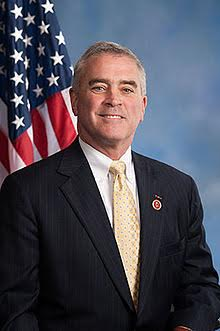
Rejects call for tighter gun laws, calls for improving mental health services –
By Patricia Beech –
Responding to last week’s school shooting that left 17 dead at the Marjory Stoneman Douglas High School in Parkland, Florida, Congressman Brad Wenstrup said “It’s time we figure out what’s driving the violence.”
“As the father of a four-year-old in preschool student, it just sickens me. I just can’t imagine what those families are going through,” he said, adding, “It’s time we get to the root cause of violence in America.”
Fifteen of the 20 worst mass shootings in U.S. history have occurred since the Columbine school shooting in 1999. The five worst have all occurred since 2007, and three of those five were in 2016 and 2017.
The Florida massacre was the 18th mass shooting this year, and has once again revived the call for restrictions on the sale of assault weapons.
But, Wenstrup, a Second Amendment advocate, said he doesn’t believe restricting gun sales will end America’s mass shootings.
He suggests that a major culprit fueling home-grown violence is the lack of effective mental healthcare services.
“There are too many people suffering with mental health issues who aren’t getting the continuum of care they need,” he said. “We used to have institutions like Longview in Cincinnati where people with mental health issues could go for help, but then we decided to mainstream everyone into the community.”
The trend toward de-institutionalization began more than 30 years ago when the Reagan administration discarded a proposed Carter-era law that would have continued funding federal community mental health centers, basically eliminating services for those struggling with mental illness.
Wenstrup says as a young doctor he discovered that mental health care had become a revolving door.
“I began to realize that mental health patients were being recycled – they would be in the hospital, then they’d get better and be released, but they would quit taking their meds and end up doing something that would land them back in the emergency room, and the cycle would start again.”
He said Congress needs to address the root cause of violence in America.
Citing a Washington Post opinion piece by Leah Libresco, a former news writer at the data journalism site, FiveThirtyEight, Wenstrup said domestic abuse, gangs, and suicide account for the majority of gun violence in the U.S.
He said he favors creating interventions for potential suicide victims, for women menaced by abusive partners, and for young people caught up in street vendettas between gangs.
“People in those groups are all in danger of being killed by guns, and they all require different solutions to protect them,” he said.
According to Libresco’s research, two-thirds of gun deaths in the United States are attributed to suicide. She argues that no proposed restriction would make it “harder for people with guns on hand to use them”.
She also said that young men, aged 15-34, who are killed in homicides comprise the second largest group of gun violence victims, with most likely being linked to gang loyalties or other street violence.
Lastly, Libresco reported that approximately 1,700 women are murdered each year, usually as a result of domestic violence.
She said many more people are killed in these ways than in mass-shooting incidents, but “few of the popularly floated policies are tailored to serve them”.
Wenstrup isn’t alone in his belief that school shootings are fueled by broader mental healthcare and social issues.
Following the Florida school massacre, former Education Secretary Arne Duncan said gun violence is an “American made societal issue that other countries do not face”.
Wenstrup says he believes a contributing factor is that many people feel disenfranchised and “unnecessary”.
“We don’t have a tribal culture where everyone has a place and a purpose,” he said. “That’s what I think is missing for a lot of people, and even though we can’t change the way society is from that standpoint, we can do better.”
Wenstrup said he also believes that violence featured in video games, television, and movies may be a factor in the escalation of gun violence in America.
“We need to look at the data to see whether these things are contributing,” he said. “We know we can’t prevent every incident, but it’s a step in the right direction.”
He rejects the idea that restricting gun ownership will bring about change.
A former surgeon who did a tour of duty in Iraq, he points out that the Second Amendment, protecting the right to bear arms, was meant to “ensure that we won’t be run over by a tyrannical government.”
“There was a very good reason for it – in countries where you don’t get to defend yourself, you usually don’t have much freedom,” he said. “With freedom comes responsibility, and when we abuse the freedoms we have, and use them in negative ways, that’s when we begin to lose them.”




